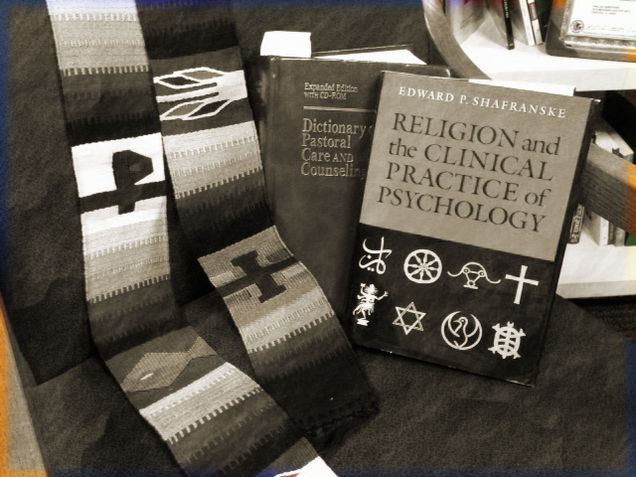How To Integrate the Pastoral and the Psychological
When I was just beginning my training at the Center for Religion and Psychotherapy, one our professors shared his experience sitting with a new client.
As he listened to the many difficulties the man was experiencing, and feeling overwhelmed, he said “you really need to see a therapist!” 
Even though he was a pastoral psychotherapist, was sitting in the therapist’s chair, and would receive payment for the work he was doing, he hadn’t yet developed an identity he could claim as his own. He hadn’t developed an identity that let him be a psychologist and a pastor, which would let him provide the pastoral counseling that would benefit those who came to him.
Students and consultants often ask me how to develop such a professional identity. In this article and the two to follow, I’ll explain the three aspects of becoming what you are trained to practice:
- Claiming the influence of your faith/religious tradition
- Recognizing that pastoral psychotherapy involves integrating multiple languages of practice: theological, psychological, clinical
- Life long professional development and involvement
In this article we’ll discuss number 1, because you can’t move on to step 2 or 3 without it.
Know your Tradition
The “pastoral” in pastoral psychotherapy or counseling has to mean something to you. It might mean something related to call or it may indicate the context in which you will embody your training. But it also needs to mean something in terms of your faith or religious tradition.
So what does pastoral mean in your tradition?
If you are Christian and Methodist, what do you know about Christianity’s historical use of the term and how the Methodist denomination has understood the term? What does this history mean for you as you live into your pastoral role, whether providing care or counseling?
Or, if you are Jewish and Reformed, is “pastoral” an historically relevant term and how is it used in the Reformed movement today? Rabbi Dayle Friedman, in her edited volume, Jewish Pastoral Care: A Pratical Handbook from Traditional & Contemporary Sources, reminds us that “the term pastoral care is one that was developed in the Christian community. It has clear roots in the Hebrew scriptures . . .” And, Rabbi Charles Sheer makes this point when he says that along with what he learned in his CPE experience, his “assessment and responses are guided by sources that preceded CPE by millennia. I come from a tradition that places much stock on the written word . . .. I am accompanied by the documents of my Jewish heritage.”
Roman Catholics historically made administering the sacraments a central focus of pastoral care. What this indicates is that pastoral practitioners are in dialogue the traditions that have shaped them as pastoral leaders.
You do not leave these influences at the door of your pastoral care and counseling classes. Conversely, you must work to articulate clear statements about how they inform what, why and where you provide pastoral care and counseling. And so I ask, do you know how your tradition has informed your current understanding of “pastoral”?
Pastoral Identity Doesn’t Just Happen
We should consider, for a moment, why integrating clinical practices and pastoral identity is difficult. One reason is because it is a professional developmental task. It takes intentionality, an educational setting that takes the pastoral aspect of your work seriously, and requires that in your educational program the formational dimension is explicitly attended to as an integral part of the program. In fact, it must shape the creation of the program. So, it takes commitment from multiple parties. You, but also your educators.
If you are thinking this is not easy—you’re right! It takes a community of pastoral practitioners to help you achieve an integrated pastoral identity. But the result is one that benefits you as a practitioner and those who come seeking help from you.
For example, when someone comes to you for assistance, they are likely coming because you have “pastoral” preceding your clinical designation. For those who seek a pastoral psychotherapist or psychologist, they hope you will be able to understand the religious, spiritual, and moral impulses that frame their concerns and view of life. Not only that, they are likely coming with the hope that you know personally what it means to live an integrated life.
You don’t have to present yourself as perfectly “together”
But you must convey that you value the place of religion and spirituality in a healthy life, and that in the work you do the psychological and the pastoral each contribute to your practice of pastoral care.
If the pastoral and psychological both contribute to your practice, your pastoral identity will be apparent in the following ways:
- You claim it as a part of your professional identity
- You are comfortable with a range of pastoral and religious metaphors that run through peoples’ lives
- You rely on a practice of psychological and theological reflection to help you understand your work
- Your professional colleagues will include those who also embrace a pastoral identity and work to help the broader public understand pastoral psychotherapy and psychology as important resources for individuals and communities in need of care.
None of these things will happen overnight, but you can begin the process of integrating your tradition into your practice now. Being comfortable with your religious tradition’s definition of “pastoral”, or its equivalent, allows you to begin integrating the the different languages of the religious and the psychological, which we’ll discuss in the next part of this series.
So what does “pastoral” mean to you and your tradition? What does it mean to provide care? Jump in on the comments and let me know.
Phillis Isabella Sheppard, Associate Professof of Pastoral Psychology and Theology, is a womanist practical theologian, psychoanalyst and sometime poet. Dr. Sheppard’s research engages the intersection where the social and the intrapsychic meet. Her recently published Self, Culture and Others in Womanist Practical Theology addresses serious lacunae in pastoral theology, psychology of religion, and psychoanalytic theory.







June 6, 2012
Dr. Shepperd, I am an ACPE Supervisory Candidate who has taught didactic seminars on Images for Pastoral Identity. I am the Protestant Chaplain at VAConnecticut, West Haven, CT and a Supervisory Education Student of the Bridgeport Hospital CPE program.
This coming Tuesday, JUne 12, I will be presenting such a didactic via videoteleconferencing to other CPE Summer units VA hospitals throughout the country. I particularly appreciate your discussion of the influence of different faith traditions upon pastoral identity development.
I would like your permission to quote this blog article in full as a resource for reflecting on Pastoral Idenity development and integration.
May I have your permission to do so?
Than kyou for your consideration.
peace,
Kurt
June 6, 2012
Hello Kurt!
I’m glad you found the article helpful. Feel free to quote this article as long as you attribute it properly and provide a link back to this site.
Phillis Isabella Sheppard, Ph.D.
Associate Professor
Pastoral Psychology and Theology
Boston University School of Theology
745 Commonwealth Avenue
Boston, MA 02215
April 16, 2013
The two are very different bodies. Here we go again with the Science and Religion. Faith is needed in the path of everything.
July 2, 2014
Kurt,
I am glad that you are encouraging the use of psychology as a support of pastoral care versus as a balance in providing “care”.
Often we have folks struggling to implement psychology in its various forms as means versus support of pastoral care. Pastoral care must be allowed to be an outworking of the individual’s sense of calling to support and be available to those in times of need, of suffering, crises, and other life changing circumstances. Psychology has its place in therapy training. When a person comes out of professional training, who gets confused as to whether he or she is a psychotherapist or a pastor then it is easy to imagine this person having much difficulties in serving a congregation as a pastor providing routine pastoral care.